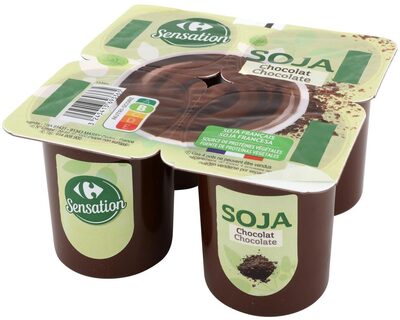
Barcode: 3245413693365
Postre de soja con chocolate
DOUBTFUL
📝 Reason: Certain components in this product have ambiguous Islamic rulings. Consultation with a qualified Halal certification authority is strongly recommended before consumption.
🏷️ Category: Plant Based Foods And Beverages, Dairy Substitutes, Desserts, Non Dairy Desserts, Chocolate Desserts, Soy Desserts, Vegan Creamy Puddings, Flavoured Soy Dessert, Vegan Chocolate Puddings, Chocolate Soy Desserts
📄 Certificates: No Gmos, Calcium Source, Green Dot, Made In France, No Lactose, Non Organic, Nutriscore, Es:Fuente De Proteinas Vegetales, Es:Point Vert, Es:Riche En Proteines, Es:Riche En Proteines Vegetales, Es:Soja Francais, Es:Source De Proteines
Ingredients:
Details
Understanding the Halal Status of Postre de soja con chocolate
Postre de soja con chocolate is a popular plant-based dessert that has captured the hearts of many. However, its Halal status is categorized as ‘DOUBTFUL,’ primarily due to certain ambiguous components within its formulation. It is critically important for consumers looking for Halal-certified products to analyze the ingredient list and any potential concerns related to its consumption.
What are its Ingredients?
The product contains a mix of ingredients, primarily a soy drink (83%), sugar, modified tapioca starch, cocoa powder (2.2%), low-fat cocoa powder, carrageenan as a thickener, salt, and natural flavors. Understanding these components is vital to determining the Halal authenticity of this product.
Ingredient Breakdown
- Soy drink (83%) (water, soybeans 6%) – Considered permissible in Islam, offered as a base for the dessert.
- Sugar – This is also considered Halal when free from any processing that involves Haram substances.
- Modified tapioca starch – Generally derived from natural sources and deemed permissible in Islamic dietary laws.
- Cocoa powder (2.2%) – Typically Halal, provided there are no conflicting additives.
- Low-fat cocoa powder – Also assumed to be Halal, similar to traditional cocoa powder.
- Thickener: Carrageenan (E407) – This ingredient raises questions since it can be derived from various sources. It is often extracted from red seaweed and is usually permissible, but consumers are advised to verify its source.
- Salt – An essential mineral that is universally accepted as Halal.
- Natural flavor – This can be ambiguous. The Halal status depends on the source from which these flavors are derived.
E-numbers in Detail
The product contains one specific E-number: E407 (Carrageenan). This thickener is commonly used in the food industry but can lead to confusion. While it originates from seaweed—a Halal source—it’s important to confirm whether any processing involved Haram elements. According to various Halal certification authorities, better practice would be to consult with a knowledgeable party to ensure complete compliance with your dietary restrictions.
Why Consult a Halal Authority?
Due to its ‘DOUBTFUL’ classification, consulting with a qualified Halal certification authority is strongly recommended. They can visually confirm product sources and manufacturing methods, particularly for less transparent items such as natural flavors and carrageenan. In Islamic dietary laws, maintaining purity in consumption is pivotal for believers, making consultation paramount.
Brand and Category Context
This dessert is categorized under several segments: Plant-Based Foods and Beverages, Dairy Substitutes, and Vegan Desserts. These categories indicate the product’s market placement, highlighting its appeal for those seeking Dairy-free or Vegan alternatives. However, it lacks a specific brand attribution, which might impact its credibility in the eyes of strict Halal consumers.
Final Thoughts
In conclusion, while Postre de soja con chocolate may tantalize your taste buds, its dubious Halal status necessitates caution. Always ensure to verify ingredients, especially for products labeled as ‘doubtful.’ Responsible consumption will not only respect your dietary beliefs but also promote a more transparent food industry. If you are looking for a Halal-approved alternative, consider reaching out to certifying organizations or scrutinizing product labels thoroughly.
